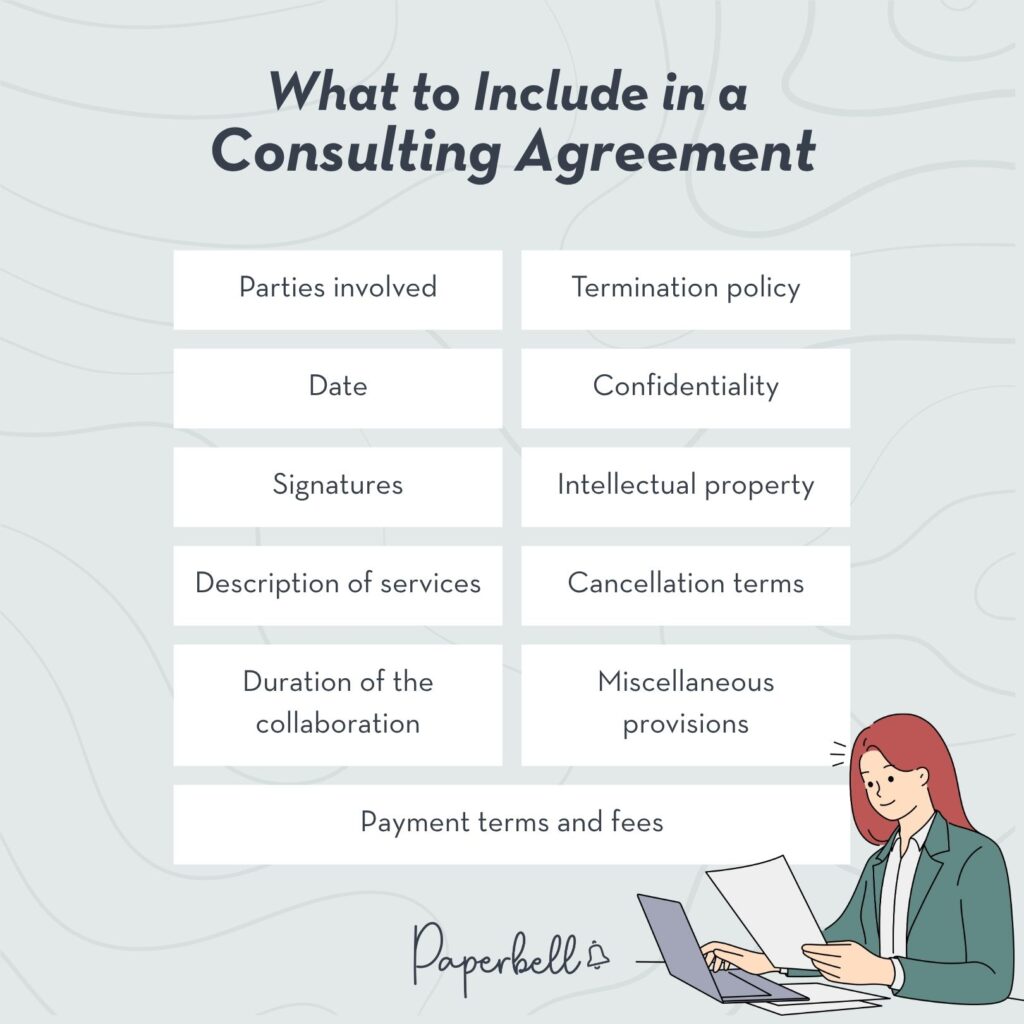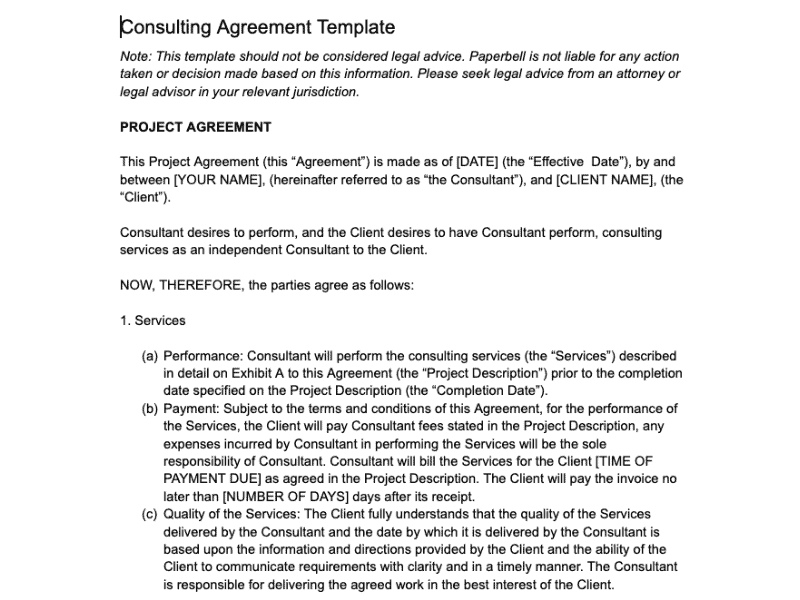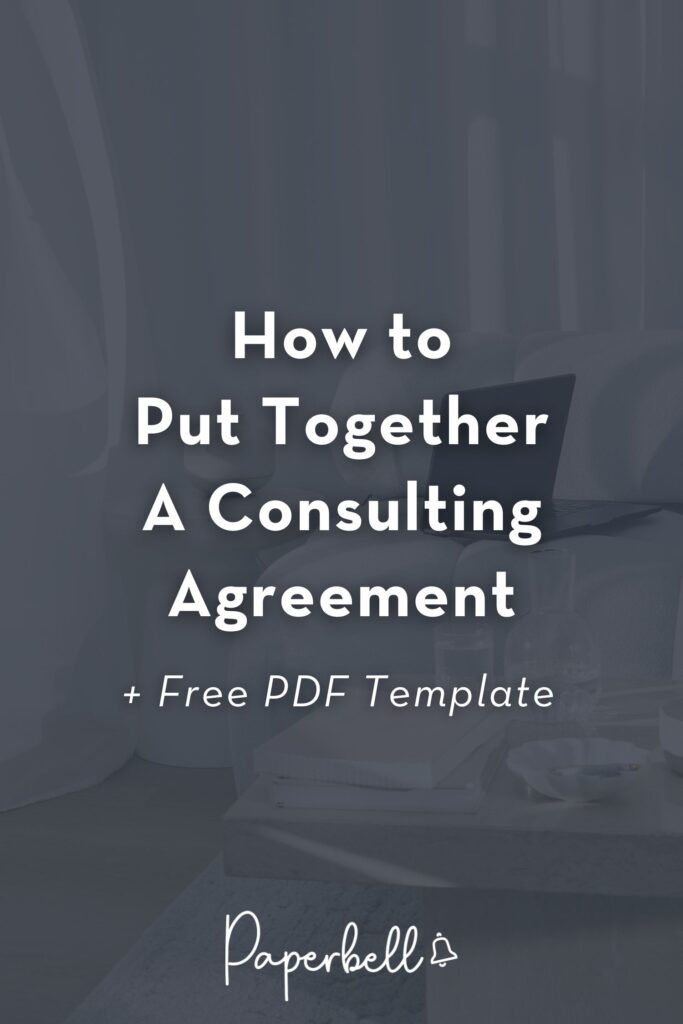If legal documents make your head spin, don’t worry. We’ve got you. In this guide, we’ll walk you through what to include in a consulting agreement, how to write one, and how to get it signed. You can also download our free PDF template to help you get started.
Disclaimer: This article isn’t legal advice. We’re sharing what’s worked for us, but you should always consult a lawyer for professional guidance.
What Is a Consulting Agreement?
A consulting agreement is a contract between you and your client that outlines the terms of your work together. While verbal agreements are technically binding, they’re nearly impossible to prove, so written documentation is always the smart move.
A signed contract protects both parties and serves as a reference point if any misunderstandings arise down the line.
At a minimum, your consulting agreement should define the following:
- The services you’ll provide
- The payment terms
- Key deadlines
- The duration of the engagement
It can also include other essential details like intellectual property rights, confidentiality clauses, or your preferred communication process.
[ Read: 7 Consulting Frameworks That Win Big Clients ]
Typically, it’s the consultant (you) who drafts the initial agreement, giving the client the option to accept, negotiate, or decline the terms.
Pro Tip: If you use Paperbell, you can attach your consulting agreement directly to your client package. That way, clients sign your terms, make their payment, and book their first session all in one smooth flow.
How to Write a Consulting Agreement

In addition to the standard elements of any legally binding contract, a solid consulting agreement should include a few key details specific to your work. Here are the sections you’ll want to cover:
- Parties involved
- Date
- Signatures
- Description of services
- Duration of the collaboration
- Payment terms and fees
- Termination policy
- Confidentiality
- Intellectual property
- Cancellation terms
- Miscellaneous provisions
Let’s take a closer look at what each of these sections means and why they matter.
Parties, Date, and Signatures
Every contract should clearly state who’s entering the agreement. That includes each party’s:
- Full name
- Address
- Any relevant business registration details
Typically, these go at the top of the contract for easy identification. You can also include a preferred contact method for future communication.
Don’t fIf you work as an independent contractor or consultant, you get to define how you work with clients, and your consulting agreement makes those terms official.
Just landed a “yes” on your proposal? The next step is to get everything in writing.
orget to date the agreement. This marks when your consulting contract takes effect and protects you from being held responsible for anything before then. A short delay between the contract issue and the signing date is fine as long as both parties agree.
The Description of Your Services
This section spells out what you’re being hired to do. Your agreement should confirm that you’re providing services for a set fee, and describe what such consulting services include.
Every consultant’s services are different so be specific. Are you offering a set number of sessions? Written reports or research? Presentations? Detail the deliverables clearly to avoid any misunderstandings.
If some aspects of your work vary, such as session frequency or total hours, that’s okay. Just do your best to describe what’s flexible and what’s not in the services provided. You can also mention anything you’re not responsible for to set expectations from the start.
[ Read: Land More Clients with This Step-By-Step Coaching Proposal Template ]
The Duration Of The Collaboration
Clarify when your work begins: upon signing, on a specific date, or after certain conditions (like an upfront payment) are met.
In the same way, state when your responsibilities end. Is it after a specific time frame or once all deliverables are completed? Optionally, you can also include blackout dates if you won’t be available during certain times.
Be clear that once the collaboration ends, you’re no longer liable for what happens next in the client’s business.
Payments and Fees
Your contract should outline your rates (whether hourly, project-based, or retainer) and when and how payments are due.
If you charge for extras like overtime, late payments, or expenses, list those here too. For example, you could charge a 5% late fee if payment isn’t made within 10 days of the invoice. This is a common practice as long as you keep it fair and transparent.
Optionally, you may also want to include your payment details, preferred currency and exchange rate policy, and who’s responsible for transfer fees.
If your work involves travel, materials, or admin tasks that aren’t included in your service fee, make it clear whether those costs fall on you or the client.
Termination Policy
This section outlines how and when either party can end the agreement.
Your contract might end automatically on a specific date or once all deliverables agreed upon are completed. That helps avoid delays from repeatedly rescheduled sessions.
You should also include an early termination clause, such as requiring written notice from the other party (e.g., 7 or 14 days in advance) and stating whether a partial refund or cancellation fee applies.
Confidentiality Agreement and Intellectual Property
As a consultant, you may have access to private information, including trade secrets or internal documents. A confidentiality clause helps protect that information and gives your client peace of mind. You can also sign a separate NDA if needed.
If you’re creating any materials (like reports or slide decks), clarify who owns the intellectual property once it’s delivered. Can the client reuse, modify, or resell it, or do you retain some rights?
Miscellaneous
This is the catch-all section for anything not already covered. Here are some things to include:
- How you and the client will communicate (email, messaging apps, video calls, etc.)
- Who your main point of contact will be
- Any limitations on availability or response time
- A cancellation policy (for example, clients must cancel or reschedule sessions at least 24 hours in advance, or be charged in full)
As you work with more clients, you’ll get a better feel for what policies matter most to you. You can update your standard agreement accordingly, or create separate templates for different types of clients and services.
Sample Consulting Agreement

To make things easier, we’ve put together a sample consulting contract you can download and customize for your business.
This free template gives you a solid starting point so you don’t need to write your entire agreement from scratch. Just be sure to adapt it to your specific services and, if needed, have it reviewed by a legal professional.
[Google Doc of Consulting Agreement Template]
[PDF Download of Consulting Agreement Template]
Consulting Agreement Templates for Your Industry
Depending on your industry, you may need to add some additional, necessary clauses to your consulting agreement. Below are specific considerations for consultants in marketing, sales, IT, and finance.
Marketing and Sales Consulting Contract Template
If you specialize in marketing or sales, your work will likely focus on helping clients increase their traffic, conversion rates, or revenue. You might include performance projections in your proposal or apply established frameworks to guide your clients.
However, it’s important to clarify in your contract that you’re not responsible for the client’s results. Add a clause that states that your services do not guarantee specific outcomes, and you’re not liable if your clients don’t reach their targets.
IT Consultant Contract Templates
As an IT, software, or cybersecurity consultant, you may be closely involved with your client’s internal systems and teams. This hands-on role can blur the lines between consultant and contractor if boundaries aren’t clearly defined.
Your agreement should clearly outline the scope of your deliverables and responsibilities. It’s also a good idea to include a statement affirming your role as a consultant (not an employee or contractor) to help prevent misaligned expectations.
When in doubt, underpromise and overdeliver. It’s much easier to exceed expectations than to renegotiate your responsibilities mid-project.
Financial Consultant Contract Templates
Financial consultants often provide advice that directly impacts business decisions and investment strategies. While your goal is to act in your client’s best interest, you’re not responsible for how your recommendations play out in the market.
To protect yourself, include a clause that exempts you from liability for financial losses. Make it clear that the client assumes responsibility for the outcomes of any financial actions taken based on your advice.
It’s also smart to carry professional liability insurance to protect yourself in case of future disputes or claims.
FAQ
What Is a Consulting Agreement?
A consulting agreement is a contract that outlines the terms of work between a consultant and their client, including services, payment, timelines, and responsibilities.
What Is the Difference Between a Consulting Agreement and an MSA?
A consulting agreement covers a specific project, while a Master Services Agreement (MSA) sets the general terms for an ongoing relationship and is supplemented by individual work orders.
What Contract Should Consultants Have?
Consultants should have a signed consulting agreement that defines their services, fees, timelines, intellectual property rights, and termination policy to protect both parties and prevent misunderstandings.
What’s the Best Tool to Manage Agreements?
Paperbell is a simple all-in-one tool that helps coaches and consultants manage contracts, payments, scheduling, a website, and client info all in one place.
Get Your Contracts Signed with Paperbell’s Online Signature Tool
Paperbell is a top-rated website and client management tool for solo consultants and coaches. It lets you upload your consulting contracts and get them signed digitally. Here’s how it works:
- Upload your PDF contract to Paperbell.
- Paperbell creates a custom landing page where your client can complete your entire sign-up and onboarding process, including contract signing.
Done! You can also edit your brand website, collect payments, run surveys, and schedule your sessions in one seamless workflow. Sign up now for a free account to test out all features with your first onboarded client.

Editor’s Note: This post was originally published in June 2023 and has since been updated for accuracy.









